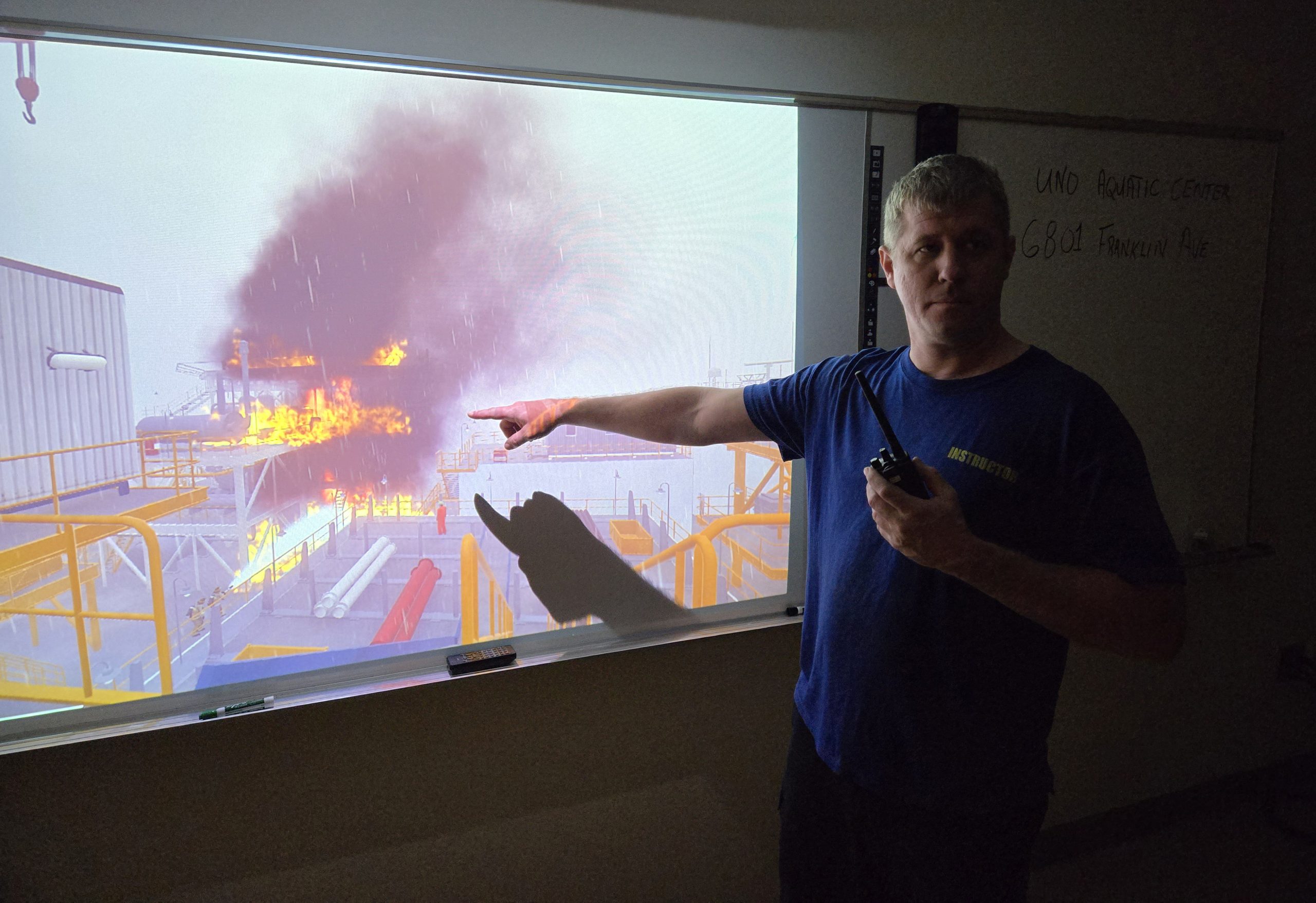Delgado Community College has upgraded its Full Mission Navigation suite and developed Louisiana’s only Coast Guard-approved, computer-based advanced firefighting program, said Rick Schwab, senior director of the Maritime and Industrial Center located in New Orleans East.
The upgrade includes Wartsila’s newest software edition for its wheelhouse simulator. At the request of corporate partners, routes were added to include transits on the Ohio River through Louisville and Cincinnati, along with the Atchafalaya River and Wax Lake Outlet in Louisiana.
“Delgado’s Maritime and Industrial Center always looks for new and improved training with the most advanced training for our maritime students and corporate partners,” Schwab said.
Randy Savoie, an experienced captain and educator, was added to the staff to teach radar and navigation classes, including steersman classes that have been fully booked recently. He is also updating class curriculum to meet changing Coast Guard/AWO/IMO requirements.
In addition, Delgado is hiring additional adjunct instructors to teach deckhand, steersman and firefighting classes to meet its 24/7 schedule, and in anticipation of an expansion of blue-water activity in the Gulf.
“The goal is to build a one-stop shop for all maritime training needs for what we see as a ‘True Career Path from Deckhand to Captain’,” Schwab said.
He added, “Simulation is a great tool that we are utilizing to train advanced skill-level personnel to sharpen their skills with the new added responsibility of being a manager of people. It requires critical thinking in adverse environments.”
The U.S. Maritime Administration (MarAd) renewed Delgado’s designation as a Center of Excellence (COE) in 2024 for five more years, allowing Delgado to partner with other COEs to provide professional mariners with needed training and licensing, he said. Delgado is the only maritime training center in Louisiana with the COE designation.
Recognizing the shortage of mariners and anticipating even more need, Schwab and his staff have been actively recruiting students at job fairs and visiting high schools to fill the maritime industry’s personnel needs. While most of the focus has been toward brown-water jobs, he projects the changes in Washington will increase blue water employment in the oil and gas sector and the required training needed.
Firefighting Training
With a staff of active and retired fire department captains and chiefs possessing years of professional experience, the team developed a new, virtual firefighting command and control class called XVT Advanced Firefighting.
When the new program was demonstrated to Coast Guard National Maritime Center management, the administrators were impressed.
“It was exactly what the Coast Guard was looking for to upgrade advanced firefighting training,” Schwab said. “As wheelhouse personnel advanced their careers, they no longer are the ones ‘putting the wet stuff on the red stuff.’ Their function is more command and control of fire teams.”
“Delgado recognizes this and utilized the vastly experienced fire chiefs and captains on Delgado’s staff to develop a one-of-its-kind class,” he continued. “We encourage training of experienced personnel to take the simulation command and control firefighting class instead of dragging hoses on the fire field. They are the managers on the scene, not the firefighters.”
Students taking advanced firefighting classes can now attend classes year-round in air-conditioned classrooms and no longer need to schedule classes to avoid hot or cold weather on the fire field.
New props have been added to the fire field, including a confined space training facility with multiple levels to simulate search and rescue scenarios. New SCBA gear has been added to the fire field to keep up with training needs.
Tuition Aid
Schwab added that Delgado is always searching for ways to offset training costs for mariners with tuition assistance available to individual students and stakeholder companies through Louisiana-funded programs like Rapid Response grants and the Incumbent Worker Grant (IWG) programs, including some in which the state picks up 50 percent of tuition costs for students.
“The IWG program provides companies with a fantastic opportunity with an investment of only a 15 percent contribution,” Schwab said. “Delgado is fully staffed to help all companies take advantage of that long-established program for Louisiana-based companies. We are always aggressively looking for ways to help mariners and companies offset costs.”
All companies and individuals, be it marine or industrial, with training needs, including specialized training, are encouraged to contact Delgado, Schwab said. “Our staff can design classes for specific needs.”
“Education is our business,” he said.
Featured image caption: Dennis Schorr, a District Fire Chief with the New Orleans Fire Department, demonstrates the XVR advanced firefighting video capabilities aboard a ship. (Photo by Richard Eberhardt)



